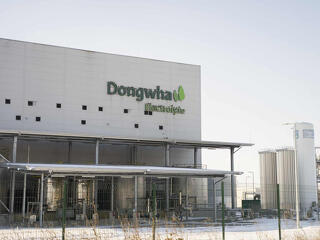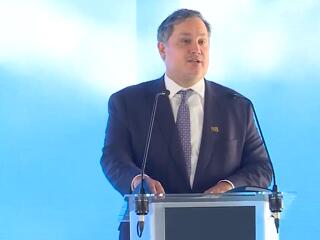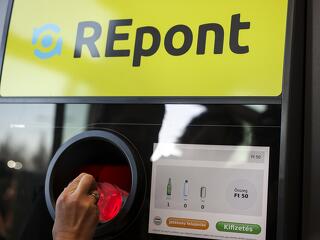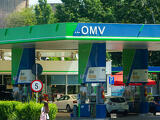SCM magazin, IV. évfolyam 6-7. szám, 2000. július-augusztus, rendezvény rovat
A cikk magyar nyelvű változata
Over 300 participants represented the food industry and retail sector at the Progresszív Round Table 2000. This year was the first in which the conference lasted three days. The presentations gave an outline of the experiences to date of the food sector, as well as the trends expected in future. Several presentations were concerned with electronic commerce. The series of lectures entitled "Efficiency, Quality, Technology" was held on the third day, Friday. In his introductory speech topic leader István Matus, CEO of Bestfoods, outlined the main defining factors of the market. In his opinion it is only possible to survive in the long term by setting high targets. One has to be different with regard to selection, services, price, innovation, and the list goes on.
András K. Kápolnai, strategic chief consultant at Andersen Consulting, gave a presentation entitled "Electronic Commerce in the Consumer Goods Sector." First of all he gave an introduction to the basis concepts, stating that the electronic economy includes electronic companies with all internal processes carried out digitally on the one hand, and business-to-business electronic commerce on the other. Electronic, or e-commerce includes B2C (business to consumer) and B2B (business to business) commerce. The total turnover of this in the United States is estimated at 20 billion dollars, within which B2C represents 13.5 billion, and B2B 5.4 billion. However, trends show that in future there will be fifteen times as much B2B e-commerce as B2C.
The aim of every country around the world is to increase revenues, break into new markets, reduce costs and build up a smaller infrastructure. For this reason new types of business model are also created. In the new electronic system logistics is placed, alongside the sales and customer agencies and the rest, between the manufacturer and the consumer. E-commerce also transforms the traditional commercial model, creating a new business approach, new products and new channels of information. Under the new model distribution service providers, information service providers and virtual shops are created. E-commerce makes it possible for companies to get a better deal in procurement, for example, as several sellers and several purchasers can participate in the same market. The e-market represents a new allocation channel.
Supply management is also changing, as the large corporations connected to each other using EDI until now, while the shops now use the faster internet.
Speaking about the future of trade between seller and consumer, Kápolnai said that the time and place of purchase will change, dependence on geographical position will decrease, while the demand for home delivery will increase. Of course, B2C is not just there so the consumer can make purchases, but also to collect information and maintain relations.
He went on to present the results of research by Andersen Consulting, to dispel some commonly held myths about e-commerce. Internet turnover in Hungary was 160 million forints in 1999, and is expected to rise to 2.2 billion forints by 2002.
The following lecture was given by Paul House, commercial director of Tesco-Global Rt., on the subject of the Tesco Direct electronic supermarket operating in Britain. The electronic store has been up and running since 1996, and offers over 25,000 products. Internet shopping costs five pounds more than the traditional method. Sixty-five percent of the 250,000 shoppers are women. In addition, shoppers at the electronic store are those who do not go shopping either because they do not have the time, or because they simply do not like shopping. By the end of the year the store will be able to deliver its products to 90 percent of the United Kingdom. The country has been divided up into zones, meaning that customers in different areas can expect different on-line promotions. The shop is open from 10:00 until 22:00, Monday to Saturday. Delivery is carried out within 24 hours.
One of the internet stores in Hungary is operated by the GRoby chain. CEO Róbert Gárdonyi said that the e-shop was made necessary by the need to compete with the hypermarkets. The greatest task in creating an electronic supermarket is the building up of the logistics system. Sándor Nagy, IT director at the chain, reported that the internet stores followed the home delivery service, which they have operated since 1996. Without this the shop, which has been operating for seven years, would no longer exist.
The majority of on-line orders arrive during the day, mainly from offices. GRoby Online is a simple shop, developed to be easy for anyone to use. The basis for an adequate range of products is the 7000 items carried by the discount chain. Of these as many items are put on the internet site as can be delivered at any time. The average value of purchases is around 10-13,000 forints, while offices order slightly more, at around 15,000 forints.
New customers turn up every day, regular customers account for 10-15 percent of all purchases. This shows how untrusting people are, finding it difficult to persuade themselves to switch to internet shopping. This is probably due to the fact that mail order companies do not have a good reputation in Hungary. Eighty percent of GRoby Online customers found out about the e-shop through word of mouth. There is still a lot to do to win the confidence of customers, said Nagy. A wider range needs to be offered, and the logistics completely re-though. Until now we only delivered in the capital city, but this service will be much in demand in the outlying districts. The logistical tasks will probably be outsourced to an external company.
The future of e-shops depends on logistics
Over 300 participants represented the food industry and retail sector at the Progresszív Round Table 2000. This year was the first in which the conference lasted three days. The presentations gave an outline of the experiences to date of the food sector, as well as the trends expected in future. Several presentations were concerned with electronic commerce. The series of lectures entitled "Efficiency, Quality, Technology" was held on the third day, Friday. In his introductory speech topic leader István Matus, CEO of Bestfoods, outlined the main defining factors of the market. In his opinion it is only possible to survive in the long term by setting high targets. One has to be different with regard to selection, services, price, innovation, and the list goes on.


























